Koulourakia are traditional Greek Easter cookies prepared during Greek Orthodox Easter festivities. Flavoured with orange zest and topped with sesame seeds, this recipe for Greek cookies will become a new staple on your Easter table.
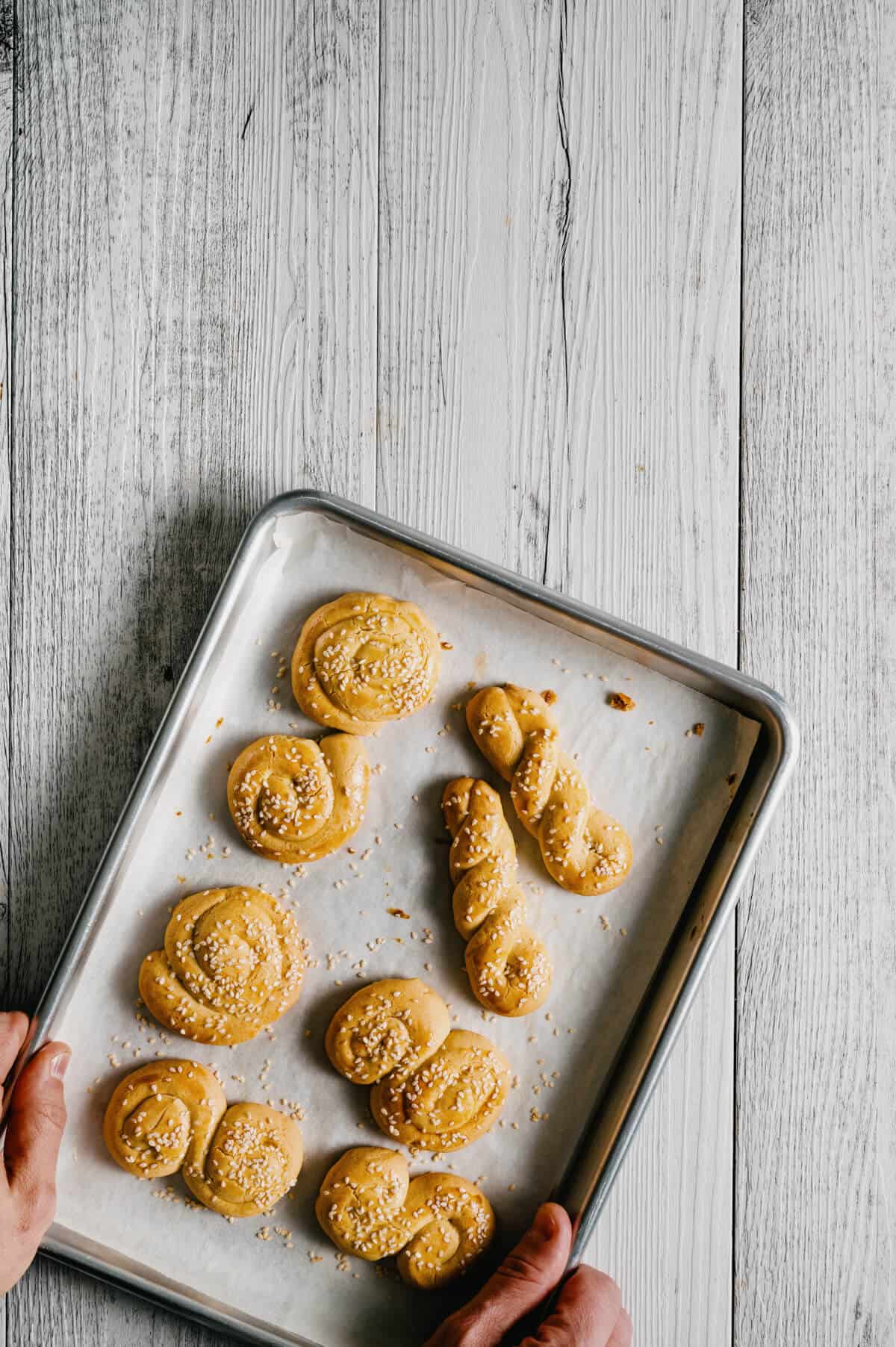
CONTENTS
What are koulourakia?
- Literally translated koulourakia means “cookies”. They are pronounced “koo-loo-ra-kee-ah”.
- Greek Easter cookies are referred to as "koulourakia pashalina" and are traditionally flavoured with orange and vanilla, glazed with egg wash and topped with sesame seeds.
- They can also be flavoured with various ingredients such as ouzo, grape must, and olive oil.
- They are produced all year round for Greek Name Day celebrations, weddings, and Christmas festivities.
Why you'll love this recipe
- My recipe was handed down from my mother. I have tweaked it a few times and am very proud of the version I offer you in this recipe.
- Koulourakia are addictive. Why, you may ask? They’re light, soft on the inside and slightly crispy on the outside. Their texture is “perfect”! 😉
- They’re fantastic served with a cup of coffee, a glass of milk or even afternoon tea. In our house, it’s traditional to dunk them in hot, milky coffee at breakfast!
- They're the perfect festive cookie. These are traditionally made during Greek Easter celebrations and enjoyed on Easter Sunday (much like kourabiedes and meolomakarona).
- They're fun to make. Making them is half the fun. Forming and shaping this traditional cookie takes a little practice and is fun for the whole family. If you prefer something a little bit easier to prepare, I can recommend my vegan lemon cookies.
Ingredients
For the full traditional koulourakia recipe - see the recipe card below.
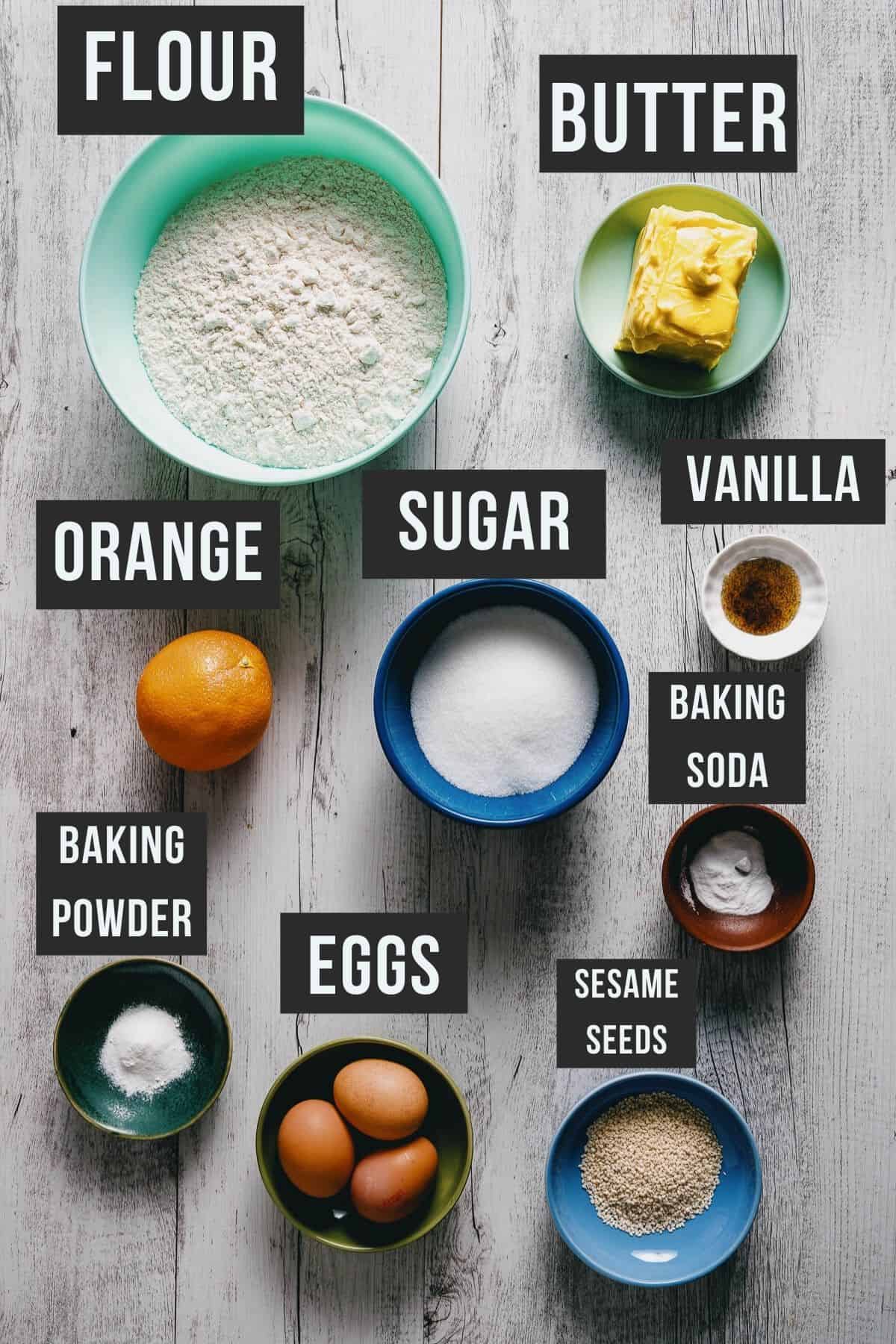
- Butter: Make sure to use good quality unsalted butter. Your butter also needs to be at room temperature (not melting) - the softer it is, the easier it is to cream with the sugar. These are butter cookies, after all!
- Sugar: I prefer to use caster (superfine) sugar when baking. You can use regular granulated sugar if that's all you have on hand.
- Eggs: Use room temperature eggs for best results.
- All-purpose flour: Use regular all-purpose flour to make these Easter biscuits.
- Orange: Koulourakia are traditionally flavoured with orange. This flavourful citrus (using orange juice and orange zest) injects a heady aroma and flavour. I sometimes like to use a combination of orange and lemon zest for an even stronger citrus hit.
- Vanilla Extract: Along with the orange, it adds a subtle sweetness and perfume.
- Baking Powder & Baking Soda: These two ingredients work together to act as a leavening agent and help produce a soft Greek Easter cookie. In Greece, it was traditional to use baker's ammonia (another type of leavening agent - also referred to as baking ammonia); however, this is not an easily accessible ingredient. The baking powder and soda work just as well.
- Sesame Seeds: Sprinkle these on top of the koulourakia - prior to baking. It is traditional to use them. However, it's OK to omit them if you don't have any on hand.
How to make this recipe
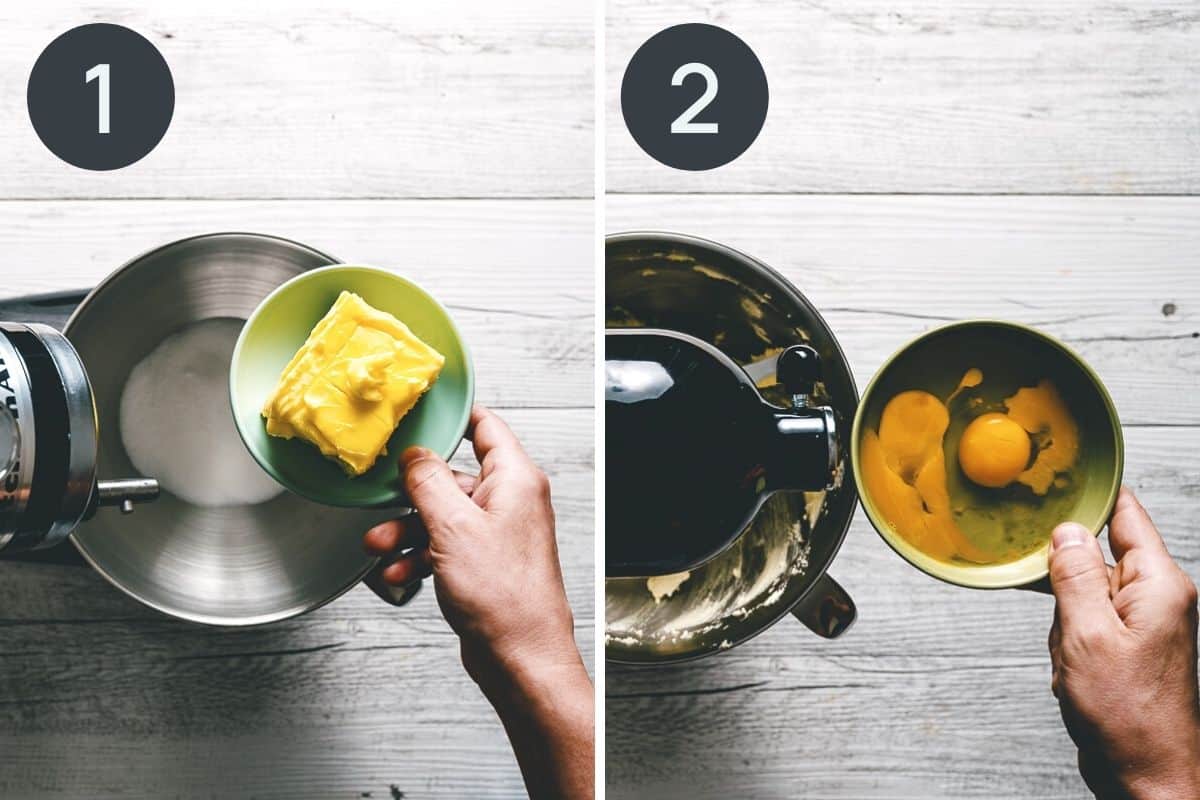
- Step 1: Cream butter and sugar in a medium bowl of a stand mixer on medium speed until pale and thick (make sure to use the paddle attachment). This should take approximately 3-5 minutes. Make sure to scrape down the sides of the bowl.
- Step 2: Add your eggs one by one ensuring they are mixed well.
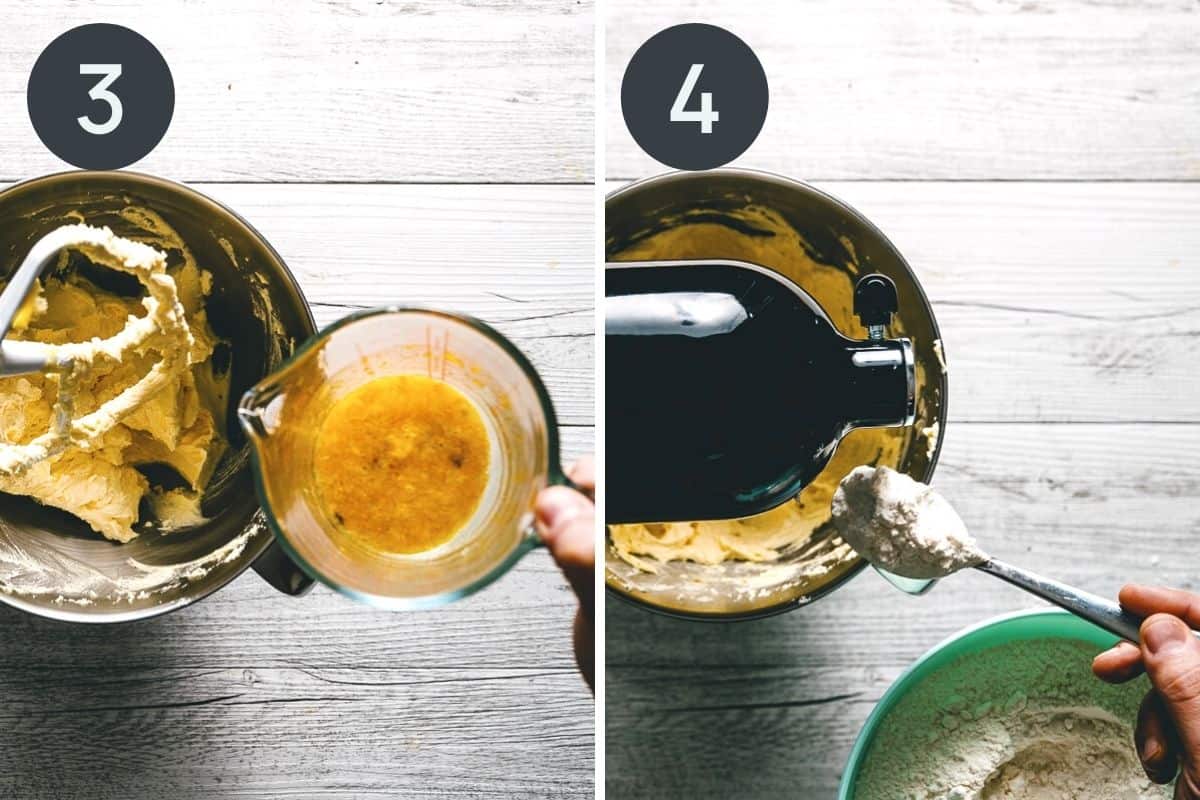
- Step 3: In a separate mixing bowl or jug, combine the orange juice, zest, vanilla, baking powder and soda. Stir and add this back to creamed butter mixture. Mix again until well incorporated.
- Step 4: At low speed, slowly add the flour (I like to use a large spoon to do this), making sure it mixes well before adding the next one. Repeat until all the flour is used and you have a soft dough.
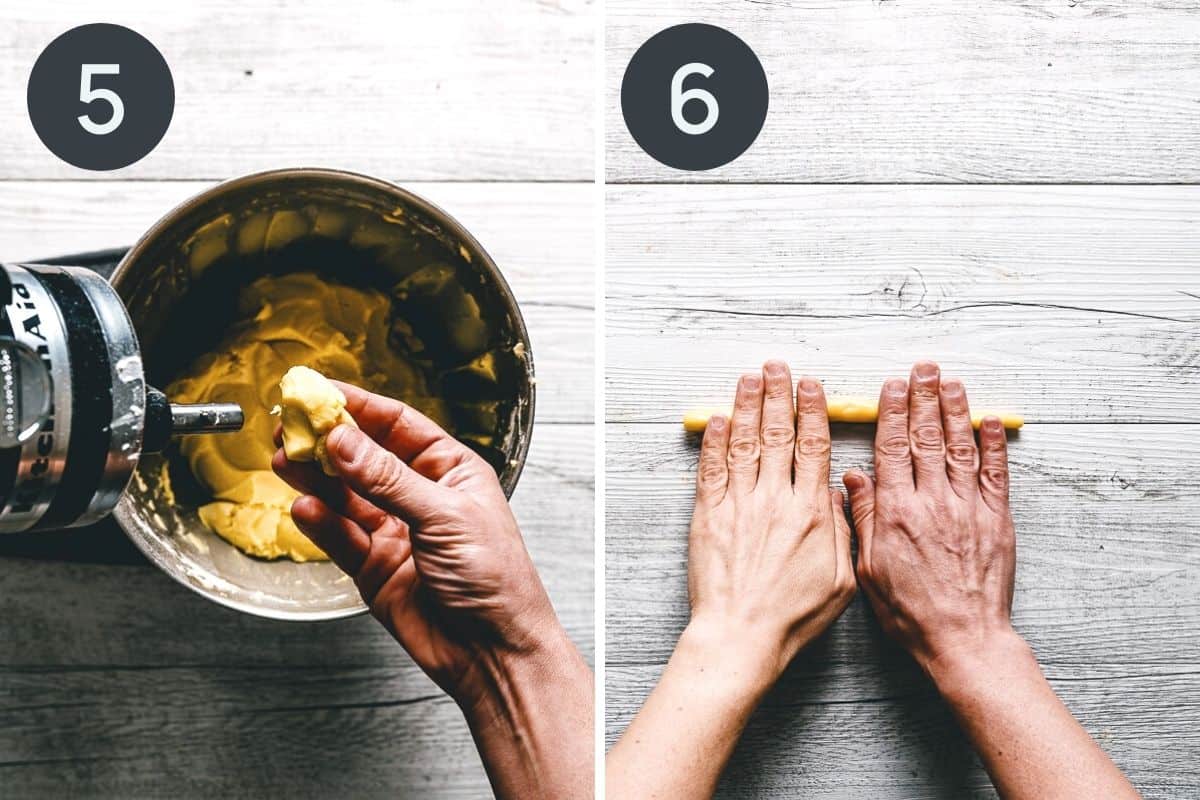
- Step 5: Check the dough with your fingers - it should feel soft (not sticky) - yet pliable. Cover with plastic wrap and allow the dough to rest for half an hour in the fridge.
- Step 6: Roll out the dough into a long rope - approx. 20 cm (7-8") and form into your desired koulourakia shapes. You can do plaits, "snails", S shapes and pinwheels (refer to picture below).
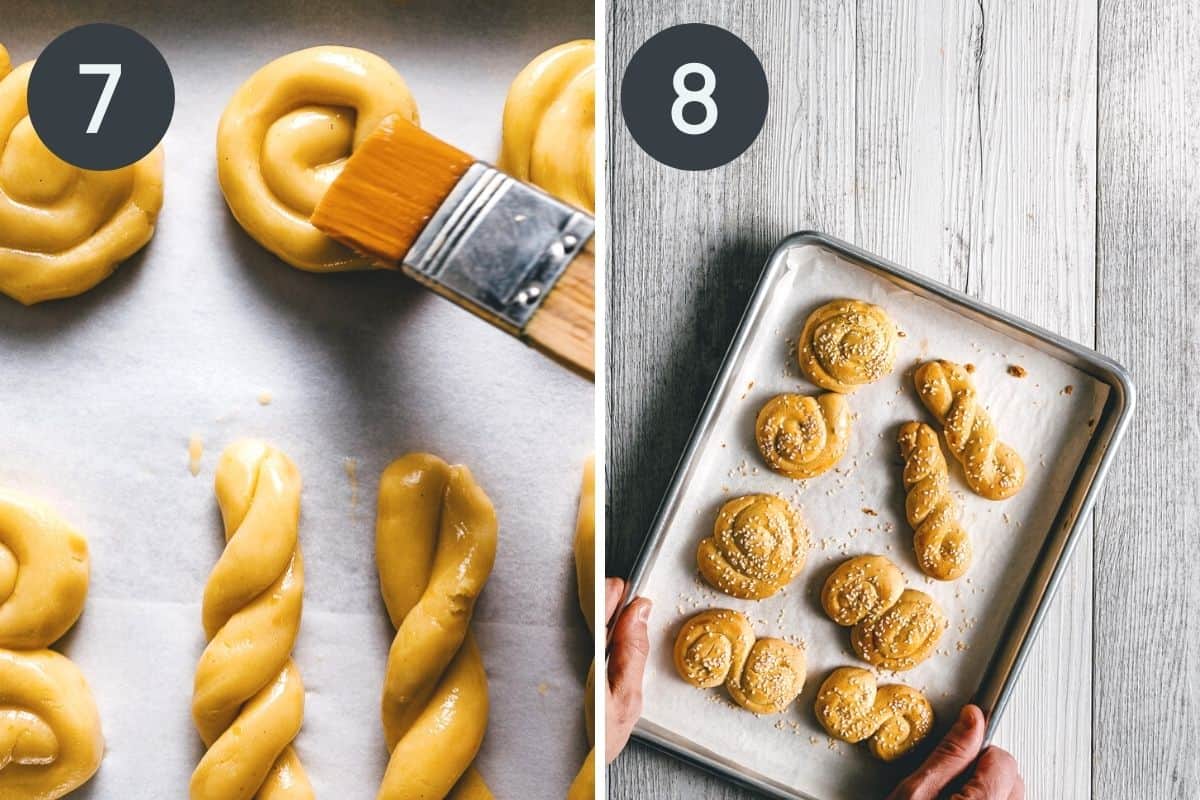
- Step 7: Preheat your oven to 170 deg C - 340 F (NOT fan-forced) and place the cookies on a baking sheet lined with parchment paper. Combine the egg yolk and milk, brush the koulourakia and sprinkle over sesame seeds.
- Step 8: Cook for 20- 22 mins until they have coloured. Leave them on the baking sheet for 5 mins. Then gently transfer the koulourakia to a wire rack to cool completely.
Koulourakia shapes
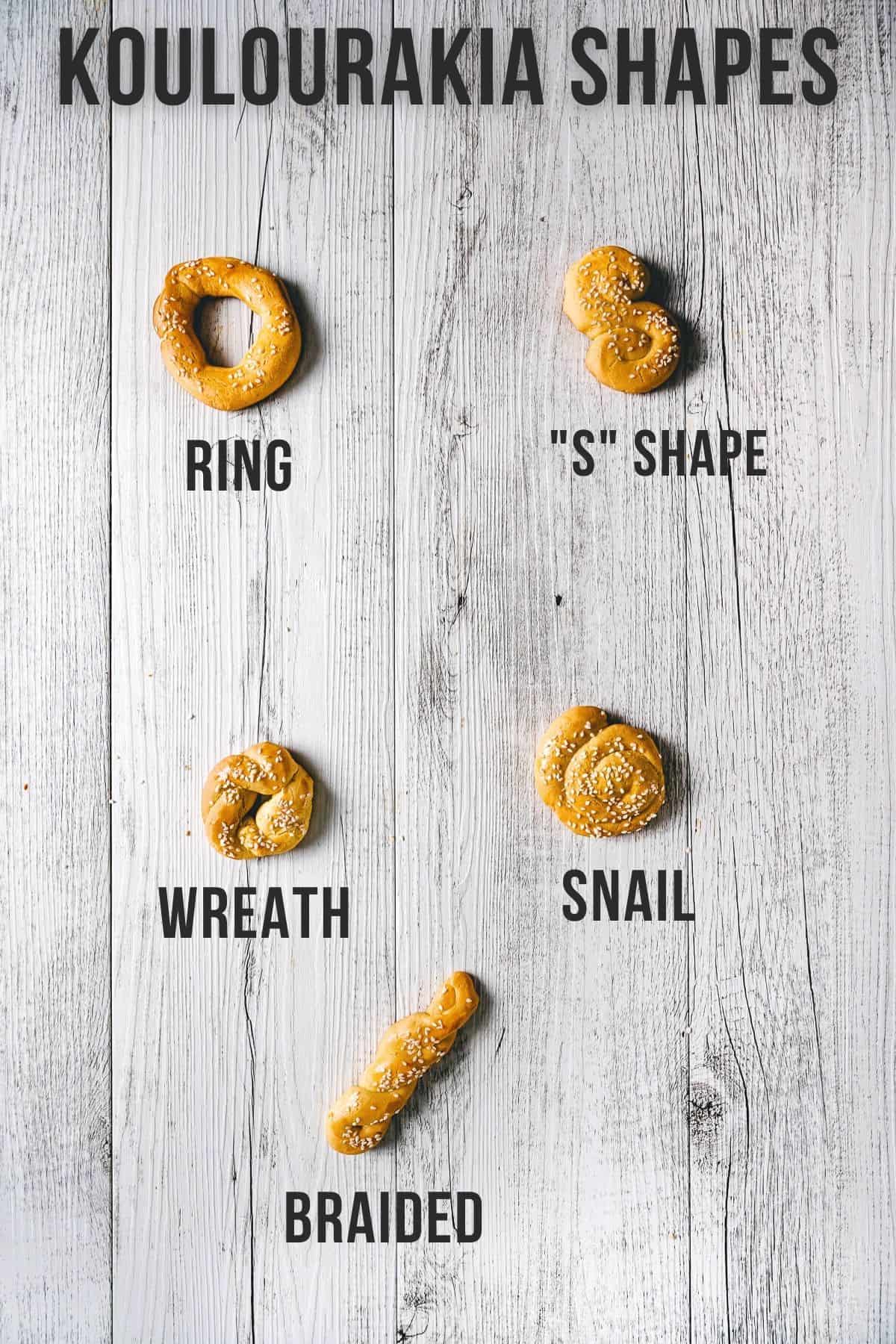
The fun part about baking these delightful Greek cookies are the different shapes you can make. The long braided koulouraki is perfect for dunking in Greek coffee!
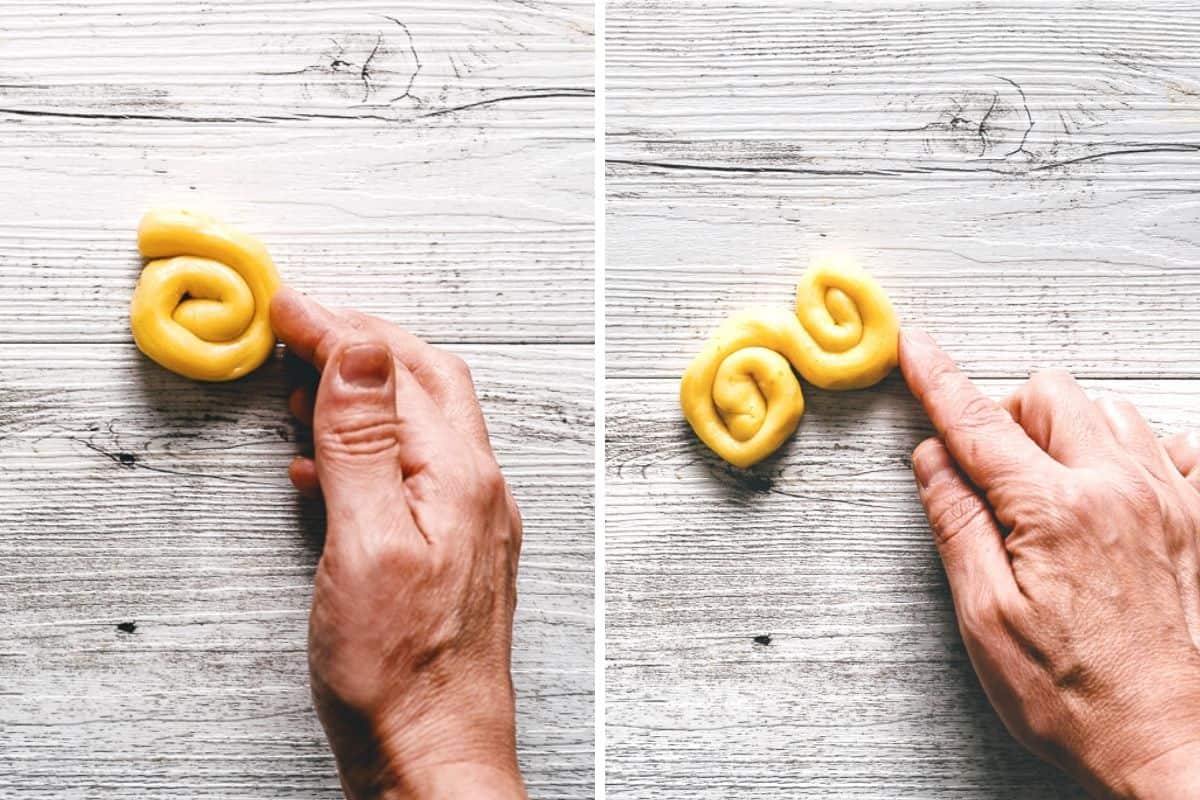
They also come shaped as "snails", wreaths, "S" shapes, rings - let your creativity guide you!
Expert tips
- Always weigh your ingredients using a scale. Being precise is the key to successful baking.
- Ensure that the butter and eggs are at room temperature. (Cold eggs can be brought to room temperature by dunking them in a bowl with hot tap water for 5 minutes).
- Achieving the right texture for the dough is paramount in producing perfect cookies. It's important to feel the dough once it's been kneaded in the stand mixer. Use your fingers and if you think it's too sticky, adjust by adding a little extra flour. Add one tablespoon at a time and feel after each mix. Don't add too much otherwise, the cookie dough will be dry and crumbly.
- Invest in an ice cream scoop. Using an ice cream scoop allows all the cookies to be uniform in size and weight. If you want to be super precise, you can weigh your koulourakia - for reference, mine weighed 30 grams - approx. 1.5 oz
- The colour of your koulourakia. Because these are butter cookies, they tend to be more on the blonde side when baked. Glazing them with egg wash gives them a nice golden brown colour. If you find they are still a little pale, try placing them under a broiler for a few minutes - just don't burn them!
- Use silicone baking mats. As you're aware, there's a lot of baking involved with Greek food, therefore consider investing in a silicone mat for longer-term kitchen use.
Storing
You can keep the koulourakia at room temperature in an airtight container for up to one week.
FAQS
Cracking can occur for several reasons.
Your leavening agent might be past its use-by date. Always check to make sure. Or, your oven temperature is too high. However, I highly recommend NOT using a fan-forced oven when baking these Greek Easter cookies. Rapid heat can cause them to crack (and yes, it happened to me the first time I made them). Keep your oven temperature at the recommended 170 deg C - 340 F.
These cookies come out of the oven and feel soft. Once they settle, they become a little firm - however, you should be able to bite into them comfortably. After a few days, they are perfect - especially for dunking into coffee or milk.
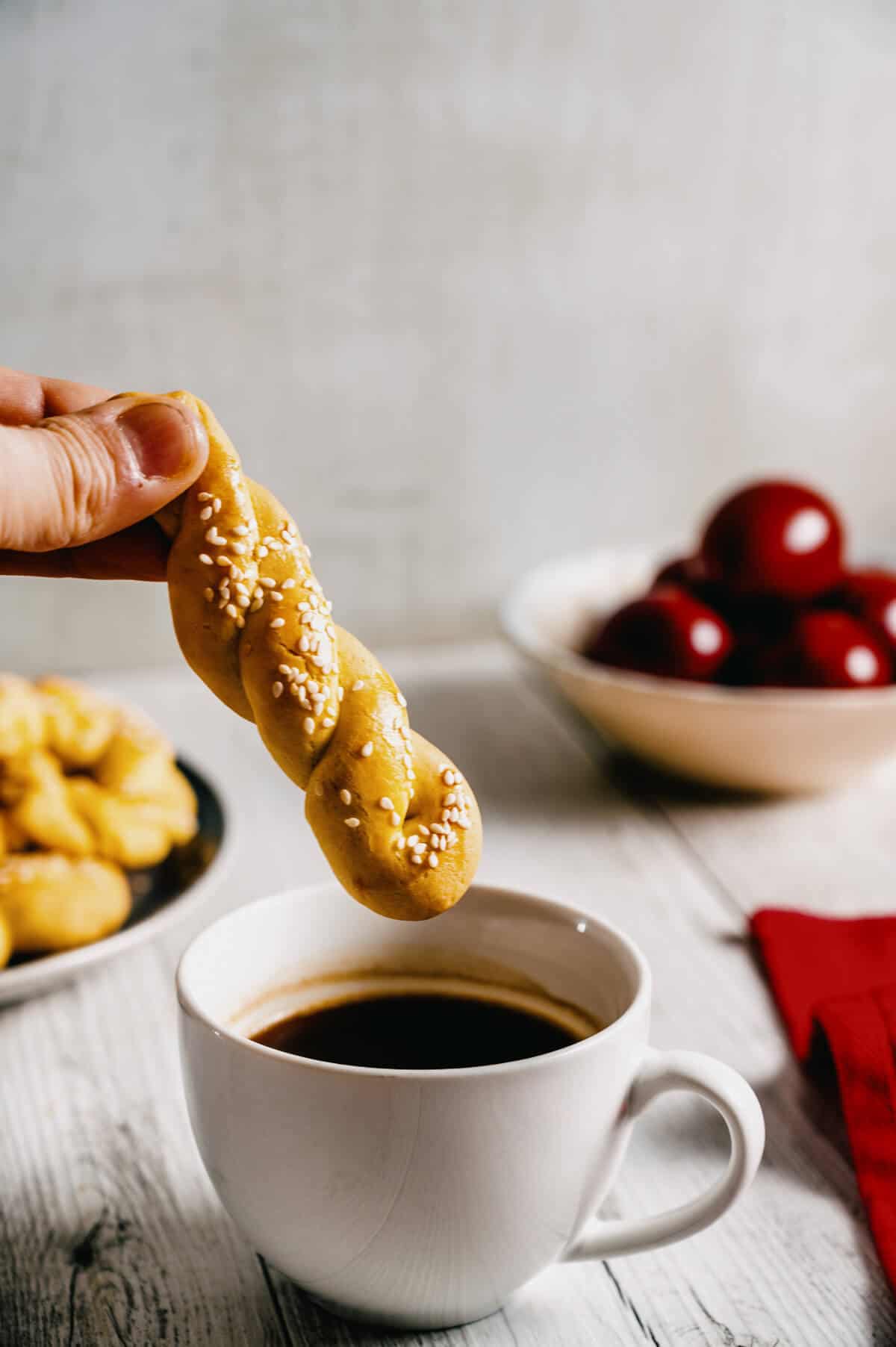
Video - how to make them
More Greek Easter Recipes
Consider adding some of these recipes during Easter time and join in the celebration.
Kalo Pascha!
If you've made this recipe or any other recipe on the blog - don't forget to rate it and leave a comment below. You can also follow the blog on Facebook, Instagram and Pinterest OR sign up to the Newsletter for the latest delicious recipes.
📋 Recipe
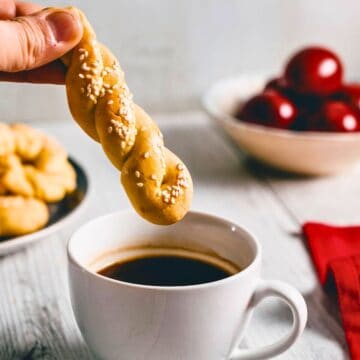
Koulourakia (Greek Easter Cookies)
Ingredients
- 250 grams butter, softened
- 200 grams sugar, caster
- 2 eggs
- 1 orange , (use juice and zest)
- 1 teaspoon vanilla extract
- 1 teaspoon baking powder
- 1 teaspoon baking soda
- 600 grams plain flour
- 2 tablespoon sesame seeds
For the Egg Wash:
- 1 tablespoon milk
- 1 egg yolk
Instructions
- Cream butter and sugar in a medium bowl of a stand mixer on medium speed until pale and thick (make sure to use the paddle attachment). This should take approximately 3-5 minutes. Make sure to scrape down the sides of the bowl.250 grams butter, 200 grams sugar
- Add your eggs one by one ensuring they are mixed well.2 eggs
- In a separate mixing bowl or jug, combine the orange juice, zest, vanilla, baking powder and soda. Stir and add this back to creamed butter mixture. Mix again until well incorporated.1 orange, 1 teaspoon vanilla extract, 1 teaspoon baking powder, 1 teaspoon baking soda
- At low speed, slowly add the flour (I like to use a large spoon to do this), making sure it is mixed well before adding the next one. Repeat until all the flour is used and you have a soft dough.600 grams plain flour
- Check the dough with your fingers - it should feel soft (not sticky) - yet pliable. Cover with plastic wrap and allow the dough to rest for half an hour in the fridge. (see note 3)
- Using an ice cream scoop, scoop out the dough and form it into a ball. If you want to be super precise, you can weigh your koulourakia - for reference, mine weighed 30 grams - approx. 1.5 oz
- Using your hands, roll out the dough into a long rope - approx. 20 cm (7-8”) and form into your desired shapes. You can do plaits, “snails”, S shapes and pinwheels.
- Preheat your oven to 170 deg C - 340 F (NOT fan-forced) and place the cookies on a baking sheet lined with parchment paper. Combine the egg yolk and milk, brush the koulourakia and sprinkle over sesame seeds.1 tablespoon milk, 1 egg yolk, 2 tablespoon sesame seeds
- Cook for 20 - 22 mins until they have coloured. Leave them on the baking sheet for 5 mins. Then gently transfer the koulourakia to a wire rack to cool completely. (see note 5)
Notes
- Always weigh your ingredients using a scale. Being precise is the key to successful baking.
- Ensure that the butter and eggs are at room temperature. (Cold eggs can be brought to room temperature by dunking them in a bowl with hot tap water for 5 minutes).
- Achieving the right texture for the dough is paramount in producing perfect cookies. It's important to feel the dough once it's been kneaded in the stand mixer. Use your fingers and if you think it's too sticky, adjust by adding a little extra flour. Add one tablespoon at a time and feel after each mix. Don't add too much other- wise, the cookie dough will be dry and crumbly.
- Invest in an ice cream scoop. Using an ice cream scoop allows all the cookies to be uniform in size and weight. If you want to be super precise, you can weigh your koulourakia - for reference, mine weighed 30 grams - approx. 1.5 oz
- The colour of your koulourakia. Because these are butter cookies, they tend to be more on the blonde side when baked. Glazing them with egg wash gives them a nice golden brown colour. If you find they are still a little pale, try placing them under a broiler for a few minutes - just don't burn them!
- Use silicone baking mats. As you're aware, there's a lot of baking involved with Greek food, therefore consider investing in a silicone mat for longer-term kitchen use.
Nutrition
This website provides approximate nutrition information for convenience and as a courtesy only. Nutrition data is gathered primarily from the USDA Food Composition Database, whenever available, or otherwise other online calculators.
© Souvlaki For the Soul
This post was republished with fresh content and video in December 2021.

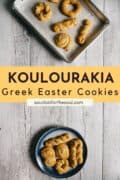
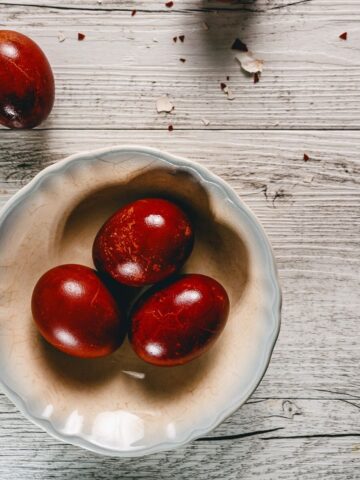
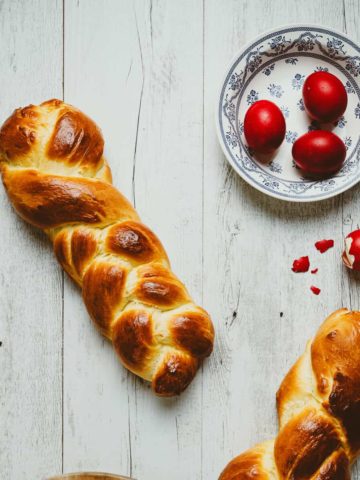
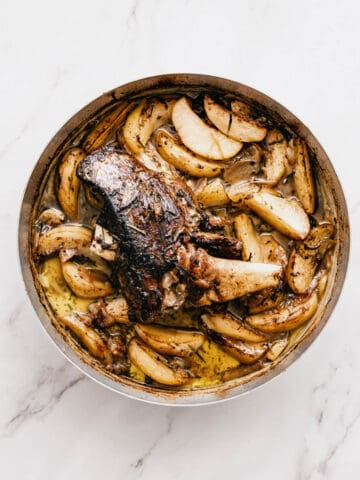
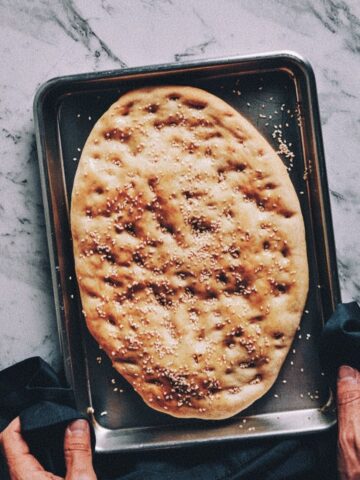
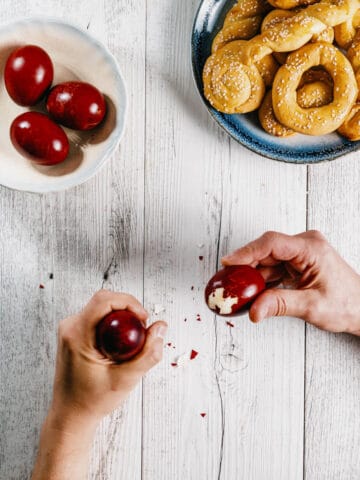
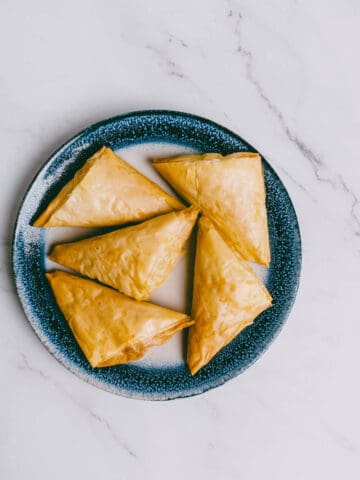
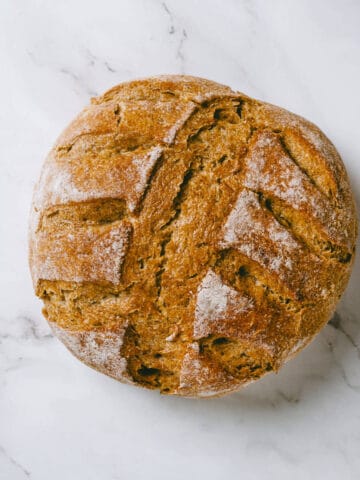
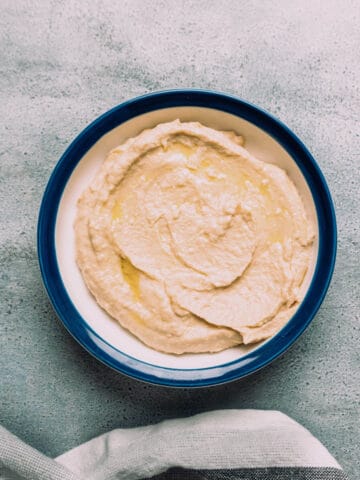
Constantina
Generally good, successful recipe. The zest and juice of one large orange was too subtle for me, so next time I'll add some lemon. Maybe it has to do with the variety of orange? The oranges in Greece are surely better than what I get from the supermarket in New Hampshire, USA. I like them a little a blonder than in the pictures, because that's what I'm used to.
Love the site and will try more of your recipes Thanks.
Peter G
Great to hear. And thanks for the feedback. Cheers!
Lauren K.
hi! if I have baker's ammonia, can I use that in place of both the baking powder and soda? would I use 2 teaspoons of baker's ammonia? thanks!
Peter G
Yes. That's right. I can't find bakers ammonia here. Thank you.
Eleni
I have been making this recipe for years and it is my absolute favourite. The orange flavour comes through beautifully, and has much more depth of flavour than the bland koulouria we’re always given from others. One year we did a taste test between these and my Yiayia’s, and everyone (including pappou) voted for these! (Sorry yiayia….!)